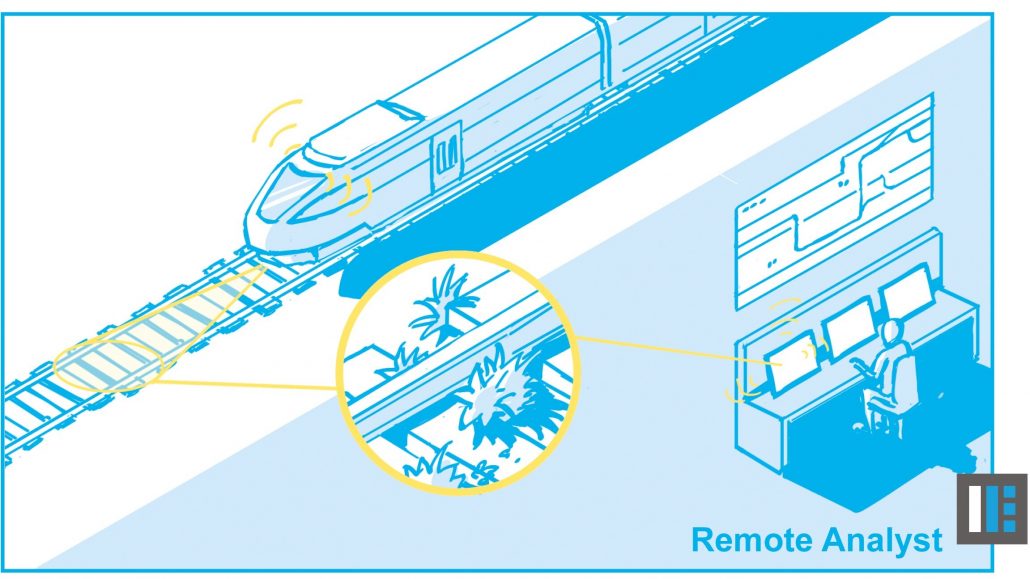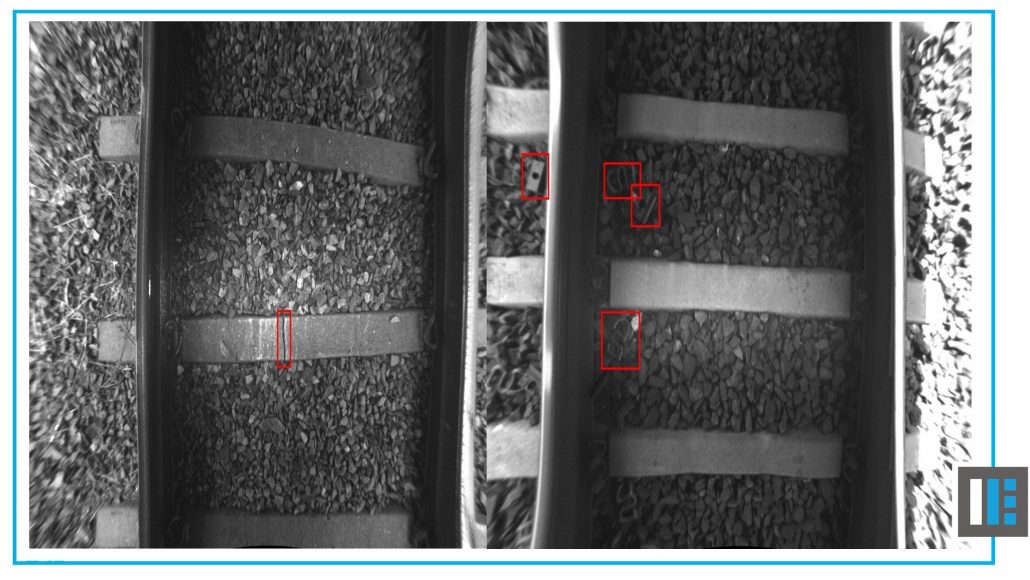Smart Infrastructure Monitoring – AI for even safer railways
2021-07-15 | Jenny Vuong | The Austrian Research Promotion Agency (FFG) is funding the HARMONY project by Mission Embedded, Frequentis and the Institute of Computer Technology at Vienna University of Technology. The goal of the project is an innovative track monitoring system that uses artificial intelligence to detect anomalies in the track infrastructure in order to prevent consequential damage at an early stage and avoid potential accidents.
In the 8th call for proposals of the funding program for the “ICT of the Future” of the Austrian Research Promotion Agency (FFG), a future scenario was addressed that places humans in an urbanized and highly technologized society. On the initiative of the BMK, technology manufacturers were invited to research innovative technologies in an interdisciplinary team to ensure harmony between man and machine. It is hard to imagine a modern society without the railroad industry. Passenger transport and especially freight transport are important cogs that ensure the continuity of our society. The constant modernization of our environment is an ongoing process and thus the need for a safe and reliable railroad infrastructure is also increasing.

More efficient, more frequent and more economical rail infrastructure monitoring
Mission Embedded acts as a technology integrator in this project and aims to research and develop an innovative system that can make the maintenance of railroad track infrastructure more efficient, highly frequented and economical by using smart infrastructure monitoring. The compact system is to be equipped with modern sensors, such as camera sensors, microphones, etc., and is to be installed in standard trains already in service. The system will scan the track infrastructure during regular runs and automatically check the resulting data for anomalies using algorithms based on artificial intelligence. The analysis is then sent to a remote analyst at headquarters to take further necessary steps. This allows potential hazards such as track breaks, track damage or track growth to be averted before devastating accidents occur. The role of the remote analyst will be re-defined and explored during this project, and ensuring user acceptance and usability of the system will be supported by integrating a human-centered design throughout the project.
The research results from the HARMONY smart infrastructure monitoring project not only have the potential to significantly increase the safety, reliability, and cost-effectiveness of rail travel, but also potentially have a lasting impact on the performance of maintenance work by redefining the role of the remote analyst. This job role could find its place not only in the rail industry, but also in all those industries where high-dimensional and complex data needs to be analyzed in a human-machine interaction.
Together with the project partners ICT, TU Vienna (experts in machine learning) and Frequentis Control Room Consulting (experts in user experience, usability, graphic design and validation) interdisciplinary expertise will be brought into the challenging research project. With the BMK as the funding body, this research project will be able to offer a customized high-tech solution from Austria to all railroad operators from all over the world.
Mission Embedded is one of the pioneers worldwide in the field of intelligent sensor and assistance systems for rail vehicles and has many years of experience and expertise in the areas of sensor integration, machine learning, automatic data processing, as well as safety and security for mission-critical applications. High-quality sensor data from several previous projects are the foundation for the present project. As consortium leader and expert for highly reliable software and hardware, Mission Embedded is mainly responsible for the technical development of the project.
The Institute of Computer Technology (ICT) of the Vienna University of Technology contributes its long-standing research know-how, its extensive expertise in embedded systems, embedded machine learning as well as sensor data analysis and makes an essential contribution to the technical development.
Frequentis – Control Room Consulting (CRC) contributes decades of experience in safety-critical environments with process analysis and information flow design and is responsible for maximizing the end-to-end security of the overall system. Frequentis CRC also addresses user-specific challenges. Key issues such as user acceptance, visualization of multi-sensor data, and ultimately the role definition of the remote analyst are addressed accordingly by means of stakeholder analyses, information flow analyses, and human performance analyses, among others.

The consortium
About Mission Embedded
Mission Embedded develops and supplies intelligent product innovations for professional applications in safety-critical fields such as railway, special vehicles, industry, air traffic control, and medical technology. Our focus is on assistance systems, autonomous driving, autonomous machines, as well as AI and machine vision in safety and security applications. Our custom-fit solutions enable our customers to turn their innovation projects into reality in the shortest possible time and with the highest quality. We support our customers in all phases of the product life cycle – from conception and system design to production and maintenance.
As part of the Frequentis Group, Mission Embedded builds on more than 70 years of expertise and innovation in mission critical applications.
About Institute for Computer Technology, TU Vienna
The Institute of Computer Technology (ICT-TUW) at the Faculty of Electrical Engineering and Information Technology at Vienna University of Technology focusses its research on embedded systems, systems on chip and software-intensive systems. The areas of embedded machine learning, sensor data analysis, safety and security, smart energy systems and requirements engineering represent important research activities, which are currently pursued in 30 externally funded projects with a total volume of about 1 million euros.
With the bachelor’s program electrical engineering and information technology as well as the master’s program in embedded systems, the ICT also contributes significantly to education in the area of digital systems, microcomputers, software development and hardware design. Since its foundation in 1975 by Heinz Zemanek, the institute has received much recognition, research awards and teaching awards, and a number of successful companies have been founded by former ICT members.
For detailed information about ICT visit: www.ict.tuwien.ac.at/.
About FREQUENTIS
Frequentis, headquartered in Vienna, is an international supplier of communication and information systems for control
centres with safety-critical tasks. Such ‘control centre solutions’ are developed and marketed by Frequentis in the
business sectors Air Traffic Management (civil and military air traffic control, air defence) and Public Safety & Transport
(police, fire brigade, ambulance services, shipping, railways). As a global player, Frequentis operates a worldwide
network of branches, subsidiaries, and local representatives in more than 50 countries. Products and solutions from
Frequentis can be found in over 35,000 operator working positions and in approximately 150 countries.
Founded in 1947, Frequentis considers itself to be the global market leader in voice communication systems for air traffic
control with a market share of around 30%. In addition, the Frequentis Group’s AIM (aeronautical information
management) and AMHS (aeronautical message handling) systems, as well as GSM-R systems for Public Transport are
industry leading global solutions.
The shares of Frequentis AG are traded on the Vienna and Frankfurt Stock Exchange under the ticker symbol FQT
(ISIN: ATFREQUENT09). In 2020, the Frequentis Group had about 1,900 employees worldwide and generated revenues
of EUR 299.4 million and EBIT of EUR 26.8 million.
For more information, please visit www.frequentis.com


